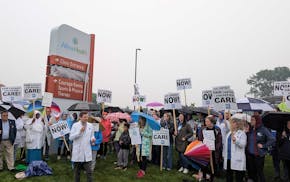The recent banking turmoil "definitely brings us closer" to a recession, Federal Reserve Bank of Minneapolis President Neel Kashkari said Sunday on CBS' "Face the Nation."
He added it's unclear how much of the recent banking stress will lead to a widespread credit crunch. But it could slow down the U.S. economy.
"This is something we're monitoring very, very closely," he said.
Kashkari's comments were his first since the the collapse of Silicon Valley Bank and Signature Bank, two of the three biggest bank failures in U.S. history. Those bank failures happened a little more than two weeks ago, just as the blackout period for Fed officials began. They limit speaking publicly while the Fed's rate-setting committee meets and makes its next interest rate decision.
Many economists have noted the recent events will likely lead banks to be more hesitant to lend out money as they focus instead on shoring up their balance sheets.
Fed Chairman Jerome Powell also nodded to the likelihood of tighter credit conditions last week, which he noted could also help bring down inflation, meaning the Fed might not have to raise rates as much as it otherwise would.
Kashkari emphasized the banking system is resilient and sound.
"The banking system has a strong capital position and a lot of liquidity and has the full support of the Federal Reserve and other regulators standing behind it," he said.
Still, he noted it might take some time for the "stresses" to work their way out of the system, acknowledging the exposure some other banks might have to longer-term Treasury bonds — an issue for Silicon Valley Bank — and some losses expected in commercial real estate.
He also pointed to positive signs such as deposit outflows seeming to have slowed.
"Some confidence is being restored among smaller and regional banks," he said.
Some lawmakers have criticized the Fed for not doing more to address issues at Silicon Valley Bank before its collapse.
Kashkari said he didn't know the specifics of that case and noted the Fed is conducting a review to better understand what happened. But he added most banks have done a "much better job" of managing their risks in advance of rising interest rates.
The Minneapolis Fed has conversations with its bank supervisors and banks about risk all of the time, he said.
"It doesn't mean that we are perfect," he said. "But I know across the Federal Reserve that bank supervisors have been focused on these very exposures since before the interest rate increases even began last year."
During the 2008 financial meltdown, Kashkari was a Treasury Department official who helped set up the Troubled Asset Relief Program, which bailed out some of the biggest banks. Since then, he's often criticized that the biggest banks are still "too big to fail."
"It's unfair," he said Sunday. "It's an unfair playing field that puts enormous pressure on regional banks and community banks, and that needs to be addressed."
Once this banking turmoil subsides, he said the U.S. needs to amend its regulatory system to ensure the banking system is both sound and fair so that community and regional banks can thrive.

Bushel Boy, Minnesota's local tomato grower, sold
After 60 years, federal cuts shutting down Job Corps center in St. Paul

In a first, Minnesota doctors walk their own picket line, then hustle to see patients
It's harder to find a job this year, especially a corporate position

